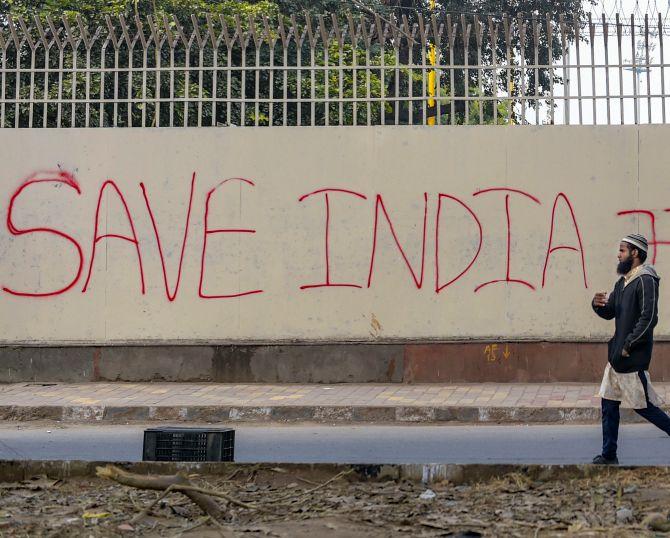'This updated NPR database along with Aadhaar Number would become the mother database and can be used by various government departments...' the home ministry declared in July 2015.
'UID/Aadhaar has been used as a fish bait to ensnare and entrap present and future generations of citizens,' warns Gopal Krishna.

Annexure 1 of the notification of Government of India that constituted the Unique Identification Authority of India (UIDAI) deals with the Role and Responsibilities of UIDAI.
The fourth point in it reads: 'Implementation of UID scheme will entail' taking 'necessary steps to ensure collation of NPR with UID (as per approved strategy)'.
NPR refers to the National Population Register and UID refers to the 12-digit demographic and biometric data-based number which has been given the brand name Aadhaar.
The Aadhaar (Targeted Delivery of Financial and Other Subsidies, Benefits and Services) Act, 2016 was enacted and published in the Gazette of India on March 26, 2016.
Section 59 of this law reads: 'Anything done or any action taken by the Central Government under the Resolution of the Government of India, Planning Commission bearing notification dated the 28th January, 2009 meant for UIDAI, or by the Department of Electronics and Information Technology under the Cabinet Secretariat Notification bearing notification dated the 12th September, 2015, as the case may be, shall be deemed to have been validly done or taken under this Act.'
NPR finds mention in the Sub-rule (4) of Rule 3 of the Citizenship (Registration of Citizens and Issue of National Identity Cards) Rules, 2003 under Citizenship Act, 1955 for country-wide National Citizenship Register (NRC).
As per the minutes of a meeting of Committee of Secretaries held under the chairmanship of the Cabinet Secretary on November 23, 2015 in committee room, Cabinet Secretariat, Rashtrapati Bhavan to discuss the strategy for Aadhaar enrolment as per the target set by the government during PRAGATI review in respect of UIDAI and registrar general of India states, 'RGI informed that the NPR updation exercise is nearing completion in most of the states. This exercise will throw up data for mapping village I habitation level households covered under Aadhaar and can be utilised for targeting left over cases for Aadhaar enrolment effectively.'
'RGI also informed that a proposal has been mooted with the DBT Mission to establish permanent enrolment centres at Tahsil I taluk level as 'hubs' and various enrolment centres at village level as 'Spokes', This provides a template for establishing permanent enrolment centres integrating the twin approaches under NPR and Aadhaar.'
The 'integrating the twin approaches under NPR and Aadhaar' which is referred here is the same as taking 'necessary steps to ensure collation of NPR with UID (as per approved strategy)' underlined in the notification mentioned in Section 59 of the Aadhaar Act, 2016.
The minutes reveal that 'Home Secretary stated that RGI is preparing National Register for Indian Citizens under the Indian Citizenship Act. As per the provisions of the Citizenship Act, RGI has the mandate to collect biometric of all residents and updating National Population Register as a precursor to the National Citizenship Register. To avoid duplicative effort, it was decided by the Cabinet that UIDAI & RGI will collect biometric and other information in allotted States for generation of Aadhaar by UIDAl, and mutually share the information.'
After that a decision was taken 'on the issue of sourcing of biometric data from UIDAI for preparing National Register for lndian Citizens under the Indian Citizenship Act.'

The notification of the ministry of home affairs dated July 31, 2019 states that the central government has decided 'to prepare and update the Population Register and the field work for house to house enumeration throughout the country except Assam for collection of information relating to all persons who are usually residing within the jurisdiction of Local Registrar shall be undertaken between the 1st day of April, 2020 to 30th September, 2020.'
Significantly, the ministry of home affairs issued a release dated July 22, 2015 titled Linking of NPR data with Aadhar Numbers.
It reads: 'The Government has decided to update the National Population Register (NPR) and seed the Aadhaar number in NPR database at an estimated cost of Rs 951.35 crore. The field work would be completed by March 2016.'
'This updated NPR database along with Aadhaar Number would become the mother database and can be used by various government departments for selection of beneficiaries under their respective schemes.'
'There is no duplication of efforts as all the agencies namely Registrar General of Citizen Registration India, Ministry of Home Affairs, Unique Identification Authority of India, NITI Aayog, Direct Benefit Transfer (DBT) Mission, Ministry of Finance and State/Union Territories Governments are working in close coordination for completion of the above exercise.'
This was stated by the minister of state for home affairs in a written reply in the Lok Sabha.
As apprehended, the convergence of the initiatives of the MHA and UIDAI was part of the design the very outset.
UID/Aadhaar for residents of 180 days and seemingly related social schemes for citizens has been used as a fish bait to ensnare and entrap present and future generations of citizens at the behest of transnational commercial czars and military alliances.
A joint reading of the notifications of 2009 constituting UIDAI, MHA release of July 2015, minutes of November 2015, Section 59 of the Aadhaar Act, 2016 and 31st July, 2019 under the Citizenship Act, 1955 reveals that as per approved strategy 'NRC, NPR & UID/Aadhaar Number are part of a 360 degree surveillance project for profiling and mining of data of inhabitants and residents for the 'nth time'.'
This has been disapproved by the Supreme Court's nine-Judge Constitution Bench. The new amendment in the Citizenship Act, 1955 (Citizenship Amendment Act, 2019) which was notified in the Gazette of India on December 12, 2019 has ensured that this law deals with the inhabitants of 'undivided India', divided India and now some inhabitants of Afghanistan as well.
Notably, this surveillance project has unfolded in the regions of 'undivided India' besides Afghanistan.
NRC, NPR and UID/Aadhaar or Pakistani National ID Card (NIC) or the Bangladeshi National Identity Card (NID) or Afghanistani Electronic National Identity Cards (e-Tazkira) are part of the unprecedented change from targeted surveillance of individuals to indiscriminate mass surveillance of the entire populations.
Informed citizens can respond to such designs only by exercising their right and duty of non-cooperation and civil disobedience against unjust laws.










